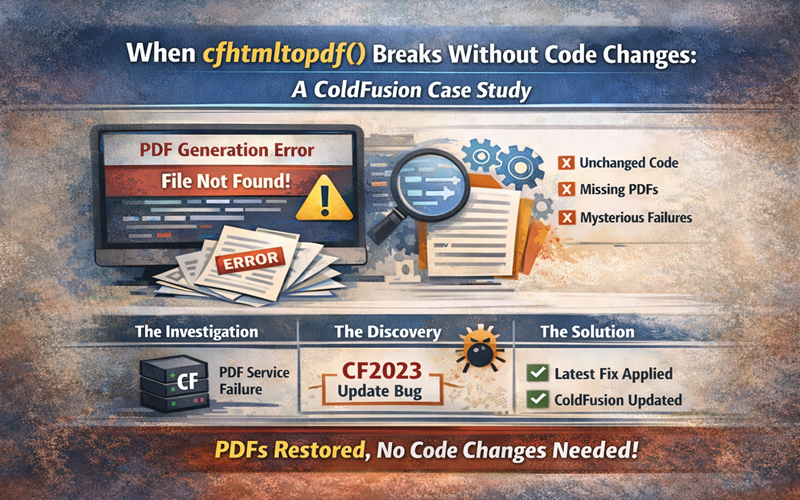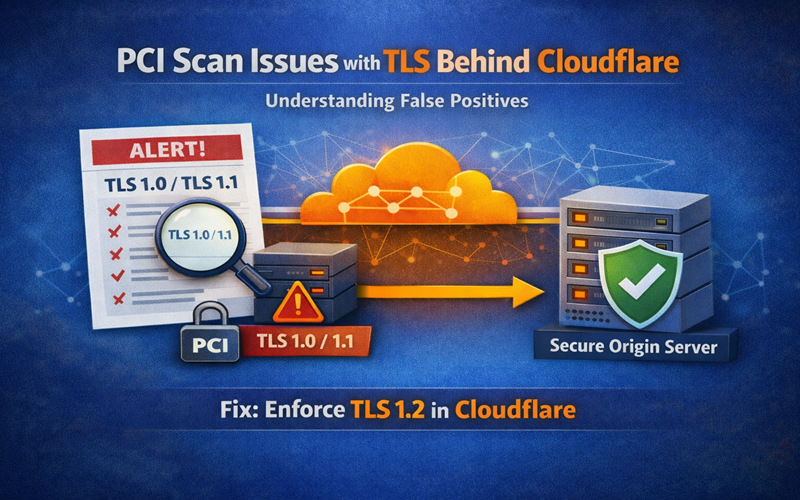Secure APIs are the backbone of modern web applications, and if you’re running Adobe ColdFusion, you depend on Java’s trust store (the keystore) to keep those HTTPS connections alive and trustworthy.
But what happens when ColdFusion suddenly fails to connect to external APIs like Stripe, Salesforce, or even your internal HTTPS services?
If you’re seeing errors like:
PKIX path building failed: unable to find valid certification path to requested target
…you’re likely dealing with a missing or outdated certificate in the Java keystore. This blog post explains why this happens and how to fix it.
Why ColdFusion Trusts Java (And Sometimes It Breaks)
ColdFusion uses the Java Virtual Machine (JVM) under the hood. That means when ColdFusion makes an HTTPS connection, such as with CFHTTP or cfmail to an SMTP server, it relies on Java’s keystore (typically cacerts) to validate that connection.
How the Certificate Chain Works
A secure connection doesn’t just rely on the server certificate, it needs the full chain of trust:
Root Certificate → Intermediate Certificate → Server Certificate
- Root certificates are rarely changed—typically every 15 to 25 years. Since they’re embedded into systems, changes require operating system or browser updates.
- Intermediate certificates, on the other hand, are rotated more frequently, often every 1–5 years, depending on the CA’s policies or security events (e.g., key compromise, expiration, or changes in best practices).
The Problem?
Even modern Java installations can sometimes miss newer intermediate certificates. When that happens, ColdFusion’s outbound HTTPS calls break, leading to connection errors.
Common issues in ColdFusion:
- An updated intermediate certificate not yet present in Java’s keystore.
- Java installations (especially older ones) lacking updated root/intermediate certificates.
- ColdFusion failing to connect to modern APIs (like Stripe, Salesforce, or others) due to missing trust anchors.
The Fix: Importing Certificates into Java Keystore
If you suspect you’re dealing with a certificate issue, here’s how to resolve it step by step:
- Identify the problematic endpoint.
Determine which HTTPS URL or domain is causing the SSL handshake or certificate validation error.
- Open the site in a browser.
Use a modern browser (e.g., Chrome or Firefox) to load the site and examine the certificate chain.
- Download the certificate chain.
From the browser’s security interface, download the root and intermediate certificates (you can usually export them individually or as a chain).
- Transfer the certificates to your server.
Upload the downloaded certificates to the server where Java and ColdFusion are running.
- Import the certificates into the Java keystore.
Use the keytool utility to import each certificate into the appropriate Java keystore (typically $JAVA_HOME/lib/security/cacerts).
Example: keytool -import -alias intermediate-cert -keystore cacerts -file intermediate.crt
- Restart ColdFusion.
After importing the certificates, restart the ColdFusion service to apply the changes.
- Test your application.
Verify the application can now establish SSL connections without error.
When to Call in the Pros
At xByte, we verify whether or not the new root/intermediate certificates are trusted by existing versions of Java. Sometimes these certificates can take several Java iterations before they’re trusted in the cacerts file. If you’re experiencing issues with your CFHTTP requests, then don’t hesitate to reach out to our US base engineer’s. We’re able to promptly add the new certificate to your existing keystore so that your CFHTTP requests can continue running as expected.
Further Reading
Final Thoughts
SSL failures in ColdFusion are rarely about ColdFusion itself – they’re about Java’s trust in the certificate chain. And with intermediate certificates rotating every few years, this issue is bound to happen eventually.
Rather than stress about every CA change, let xByte Cloud handle it. We maintain hardened, ColdFusion-optimized hosting environments where trust is monitored, and performance is preserved.


